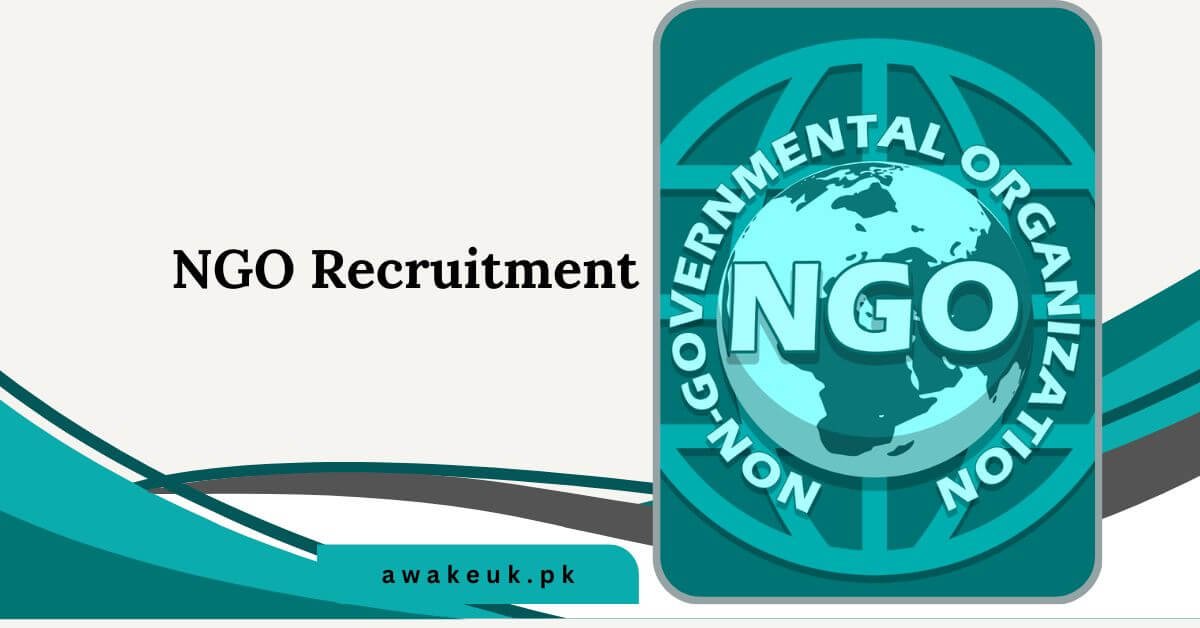NGO Recruitment 2024 – Apply Now
Non-governmental organizations (NGOs) are nonprofit entities that operate independently of government intervention. They are instrumental in the global resolution of social, natural, beneficial, and formative issues. The size, scope, and mission of NGOs can vary significantly; some are focused on the requirements of local communities, while others operate on a global scale. They frequently rely on volunteers, awards, and gifts to fund their endeavors.
Investigating employment opportunities within these organizations can be an excellent career move if you are enthusiastic and on the brink of achieving a qualification. This coordinate will assist you in locating available positions, obtaining a contact address, and preparing for the nonprofit sector.
Job Opportunities at NGOs:
Nongovernmental organizations (NGOs) provide employment opportunities that are tailored to unique skill sets and professional backgrounds. Openings that are frequently encountered include:
- Program Officers: Program officers are responsible for the planning and execution of projects that are in accordance with the organization’s goal.
- Field Specialists: Establish a specific connection with communities to assess their requirements and offer services.
- Research investigators: Investigate, evaluate, and interpret data to guide program development or approach selection.
- Fundraising Facilitators: Develop strategies to obtain budgetary support through events, gifts, or honors.
- Communications Pros: Communications professionals are responsible for overseeing open relations, social media outreach, and showcasing endeavors.
- In addition to these positions, numerous NGOs are also seeking regulatory staff, back officers, human resources faculty, and IT specialists.
Various channels can be used to locate open work opportunities at NGOs:
- NGO Websites: A plethora of organizations publish their job vacancies on their official websites, specifically in the “Careers” or “Jobs” section.
- Job Sheets: Websites such as Idealist.org or Devex.com specialize in nonprofit job listings.
- Social Media Stages: LinkedIn and Facebook groups that are dedicated to nonprofit professions frequently distribute job postings.
- Events for Networking: Conferences or seminars that are associated with specific causes can provide opportunities for organizing discussions regarding occupations.
Check Also: Skill Shortage Jobs in France – Apply Now
Benefits of NGO Recruitment:
- Meaningful Work: NGO positions enable individuals to contribute to causes that are important to them, including education, healthcare, environmental protection, and human rights. This experience provides a profound sense of purpose and fulfillment.
- Skill Development: NGOs frequently assign employees a variety of responsibilities, which enables them to cultivate a comprehensive skill set that encompasses project management, fundraising, communications, and data analysis. This, in turn, contributes to the overall development of their careers.
- Global Networking Opportunities: Non-governmental organizations frequently collaborate with a diverse network of professionals or operate internationally, providing employees with the opportunity to explore global perspectives, establish partnerships, and access resources that enhance their professional relationships.
- Enhanced Social Awareness: Employment with an NGO broadens employees’ perspectives on global and local issues, thereby increasing their awareness of social issues and challenges. This can be beneficial in both personal and professional life.
- Opportunities for Career Advancement: Numerous nongovernmental organizations (NGOs) provide pathways for career advancement, ranging from entry-level positions to leadership positions. Particularly in lesser or expanding nongovernmental organizations (NGOs), employees may assume progressively greater responsibilities as they accumulate experience.
- Transferable Skills: Non-governmental organizations (NGOs) offer employees the opportunity to acquire experience in resource-constrained environments, which enables them to develop the ability to innovate and manage limited budgets. These skills are highly valuable in a variety of sectors, including the corporate world.
- Flexibility in Work Culture: Numerous non-governmental organizations (NGOs) offer flexible work hours, locations, or the possibility of remote work. This adaptability facilitates a more harmonious work-life balance and accommodates individual requirements.
- Access to Training and Development: Nongovernmental organizations frequently allocate resources to train their personnel to ensure that they are capable of fulfilling specific responsibilities, including technical skills and leadership development. This investment improves the expertise and future employability of employees.
- International Opportunities: Employees are frequently allowed to work or travel abroad on a variety of initiatives, as larger NGOs frequently operate on a global scale. This experience improves adaptability and cultural competence.
- Creative Problem-Solving: NGOs frequently necessitate employees to think creatively and devise distinctive solutions, as they operate with restricted resources and complex issues. This cultivates adaptability and innovation, which are highly sought-after abilities.
- Job Satisfaction: Employees in non-governmental organizations (NGOs) frequently report higher levels of job satisfaction due to the tangible, positive impact of their work on individuals and communities. This can be more fulfilling than positions that are profit-driven.
Application Process:
Typically, there are a few stages involved in applying for positions at NGOs:
- Research the Organization: It is essential to become acquainted with the mission, values, and current initiatives of the non-governmental organization (NGO) if you have recently submitted an application. This information will assist you in the effective customization of your application materials.
- Develop Your Curriculum Vitae/Resume: Emphasize relevant experience that aligns with the requirements of the position for which you are applying. Emphasize skills such as extended administration, communication capabilities, language proficiency (if applicable), and any volunteer work associated with the NGO’s core area.
- Compose a personalized cover letter: A cover letter that is well-written should demonstrate your enthusiasm for the organization’s mission and demonstrate how your qualifications render you an ideal candidate.
- Submit your application online: The majority of non-governmental organizations (NGOs) have an online application portal through which candidates can submit their resumes/CVs and cover letters specifically through the organization’s website or via mail, as specified in the job posting.
- Follow-Up: In the event that you have not received a response after submitting your application, it is advisable to send a polite email expressing your continued interest in the position after a week or two.
- Interview Preparation: In the event that you are selected for an interview, it is important to research common interview queries that are specific to nonprofit work. Additionally, be prepared to discuss how your experiences align with the organization’s objectives.
- Remain Involved Post-Application: If you are not selected for a position promptly, maintaining a connection with the NGO by volunteering or attending events can enhance future job opportunities.
For More Info:
Email Your CV, and We’ll Find the Best Pathway For you: info@awakeuk.pk
Frequently Asked Questions:
-
How do I start working for an NGO?
A master’s degree in a pertinent field is necessary for the majority of positions within non-profit organizations. A bachelor’s degree with several years of work experience is permissible instead of a bachelor’s degree, according to certain job descriptions of non-governmental organizations. However, the majority of NGO positions are exceedingly competitive, and it is not abnormal for larger organizations to receive several hundred applications for each position.
-
Which degree is best for NGO jobs?
For this reason, getting a degree in International Studies, Law, or Sociology can be particularly advantageous for employment in an NGO. On the other hand, obtaining a master’s degree or specialization in a particular field can be extremely helpful in achieving success in specific niches within the broad spectrum of NGOs.
-
How do I join an NGO?
Conduct research and identify non-governmental organizations (NGOs) that are consistent with your interests and abilities. Inquire about volunteer opportunities by visiting the organization’s website or contacting them directly. Submit an online application form or registration form, which ought to contain personal information, interests, and relevant experience.







